
by Lisa Fuller | May 17, 2017 | Connection & Love, General, Parenting, Self-care
Dear Devoted You,
Mother’s Day is a sweet time to recognize all the good.
I feel so lucky because I’ll be able to celebrate this year with my own dear mother. She’s a quirky, creative, generous woman and an absolute treasure to me.
At the same time, life is not all happiness and joy right now for me as a mother.
One of my children is suffering. And as you know, when your child isn’t well, it can feel impossible to let that pain go.
So if your heart also aches because of an issue with your child, I want to remind you (and myself): we’re not alone.
My Mother’s Day message this year is simple: Take care of yourself.
Make a mindful choice to do the following:
- Exercise
- Eat well
- Sleep!
- Expand your tunnel vision*
*Devote time and energy to other relationships in your life. When you’re in a crisis with one child you can understandably suffer from tunnel vision. Consciously decide to continue to focus on your other children, spouse, and friends (the supportive ones). This expansion will breath life into you by widening your perspective AND for maintaining those important connections with people who love you and in the case of your other children, need your continued connection.
It’s easy to forget these basics and fall into destructive patterns when we’re filled with worry.
When you make self-care a central part of your life, you’ll find that the kindness you show yourself infuses your own life, and the life of your family with positivity. It provides a model for your child and makes the path to reach your goals and those of your family so much smoother. (source:
8 Self-Care Tips for Parents Who Have No Time for Self Care.)
You’re important to me and I’ve missed the opportunity to connect.
We’re all in this together and I appreciate the community you provide for me along the journey of motherhood (and boy it’s tough at times!)
I hope you’re well and wish you a Happy Mother’s Day.
Love,

by Lisa Fuller | Nov 16, 2016 | General, Motivation, Parenting
It was the end of our summer time together.
My sister and I had a van FULL of kids, hers, mine and our brothers’, parked in my grandmother’s driveway.
Over the years it had gotten progressively harder for me to say goodbye to my grandmother. Each year I wondered if this would be the last time I’d see her.
This year she was 99, standing in front of her cottage, coming out to watch our precious cargo get settled into the rented van. She stood there — old but not fragile — soft, but also solid as a tree. The most beautiful woman in the world.
I approached her, her arms wide open — mine open to meet her — oh Granny, thank you for everything… this is goodbye until next summer. Tears welling in our eyes. A hug that I never wanted to end.
But then the clammering in the car called to me, reminding me of the long journey ahead from Maine to the ferry in New London Connecticut to finally Long Island.
We released each other, I scrambled into the driver’s seat, feeling relief in the obvious distraction of all these kids needing me. The clear responsibility in front of me served to keep me moving.
Backing out of her short driveway, I rolled down the windows and we all cheered Bye Granny. She raised her arm in a fist and shouted, “COURAGE!”
Pulling away, I was stunned, my breath hard to catch… How did she always know exactly what to say? … Courage!?
That one word said it all in that moment. On one level my sister and I would need obvious courage to face the ten hour drive ahead with the car full of excited and soon-to-be-exhausted kids.
But Granny also knew that I’d need courage to leave her. And that she’d need courage to say goodbye to this car teaming with life, love and respect for her.
That realization pierced my heart and took my breath away.
She might also have meant the courage she mustered everyday being an ancient person in a world that valued the shiny and new. The courage to face the day without all of her many dear friends who’d died over the last 10 years. The courage to face each day with deep curiosity, interest in and love for her family and the broader community whom admired and loved her.
I haven’t spent much of my life considering courage in personal terms. I reserve it as a label for those serving in war, putting out fires, or responding to other of life’s emergencies.
But then there’s my sage Grandmother declaring what is also real: the everyday ways we face life with courage or that life requires courage of us.
I’ll never forget when my first son was born. Holding the warmth and deliciousness of him in my arms only hours after he arrived, I was in awe.
What had I gotten myself into? Looking down at him, I knew that my life would never be the same. And not in the over-used cliche way, but in the most substantial way. The way most parents — if they’re lucky — come to understand their new responsibilities.
My life was no longer about me. I now had the impossible task of keeping another human safe at every turn. How could I bear the pain of him being hurt, physically or otherwise? He was the most precious person and it would be my job to keep him safe. I knew I’d jump in front of a bus, no second thoughts, to protect this new being in my arms.
At the time, I didn’t connect this with courage. But now, jumping in front of a bus sounds like that huge kind of courage reserved for heros.
Of course, we can’t sustain the level of awareness I had that day in the hospital, but it’s still there — just under the surface — fear mixed with courage. And it’s what gets us through everyday of our parenting journey.
“Choosing courage does not mean that we’re unafraid, it means that we are brave enough to love despite the fear and uncertainty.” Brene Brown
What if we claimed this courage, not in a braggadocious way, but rather as a deep knowing that life’s most meaningful choices take courage?
I’m curious if and how this would change my feeling of agency, of possibility for myself as a parent.
Rather than just rolling out of the driveway, pushing down the fragility that is life, we instead back up and hear “courage” for what’s at hand. We listen to a child’s fear and loneliness. We stay present with a friend as they describe their teenage son spinning out of control. We visit with a drug addicted mom in the hospital as she holds her newborn. Or we accompany a friend to her chemo appointment.
I’m grateful, so grateful that my grandmother declared “courage” that day even though the naming of it hurt.
Courage is our action amidst a poignant awareness of the fragility of life.

by Lisa Fuller | Jun 11, 2016 | Encouragement, General, Motivation, Mutual Respect, Parenting
by Victoria Thorp
 In recent weeks, a new book called “Grit,” by Dr. Angela Duckworth has made quite a splash, with coverage in news outlets from CBS News to NPR to the New York Times (even David Brooks loved it).
In recent weeks, a new book called “Grit,” by Dr. Angela Duckworth has made quite a splash, with coverage in news outlets from CBS News to NPR to the New York Times (even David Brooks loved it).
Maybe you’ve read these stories or perhaps bought a copy of the book yourself. Or maybe, because it’s spring and you can barely manage the onslaught of graduations, science fair projects and final exams, you’ve been in a media blackout. Either way, I have good news: this post will explain what ‘grit’ means and why it matters to you as a parent.

Angela and I in San Francisco, May 2016
Full disclosure: Dr. Duckworth is a friend and former colleague of mine, so I’m not new to the topic of grit, nor am I fully objective about Angela. But here’s the thing about Angela: besides winning a MacArthur ‘genius’ grant and working as psychology professor at the University of Pennsylvania, she’s also the mom of two middle school girls.
And I know from a recent conversation with Angela that she’s just as humbled by the challenges of parenting as we are, despite a best-selling book and her professional success.
Here’s my attempt to boil down her brilliant book into one page…
What does ‘grit’ mean?
Dr. Duckworth (hereafter to be described as Angela) defines ‘grit’ as a combination of passion, effort, and persistence applied toward a goal over a prolonged period of time.
Why does grit matter?
According to Angela’s extensive research, grit appears to be a strong predictor of life-long success and happiness — perhaps more so than innate talent or IQ. “Our potential is one thing,” she writes. “What we do with it is quite another.”
As a parent, I appreciate this definition because it breaks down the ‘talent myth’ that seems to dominate our popular understanding of why people are able to accomplish their goals. Whether it’s looking at athletes, artists, or even entrepreneurs, stories of victories and accomplishments are usually told as if these winners were born with a particular gift that made their dominance inevitable .
What’s different about grit?
Angela’s explanation of grit provides another narrative for understanding these stories, too. One that examines the persistence that these champions applied towards their goals, their ability to not give up even in the face of failure, and the specific, difficult and prolonged practice they applied to the craft/sport/skill they were trying to improve.
Here in the Bay Area, Steph Curry is the most famous example of an athlete who wasn’t considered to have much potential as a youngster, but who’s risen to the top of the game through his determination, endless practice, and dedication.
So how can we find our passion (or help our kids find theirs)?
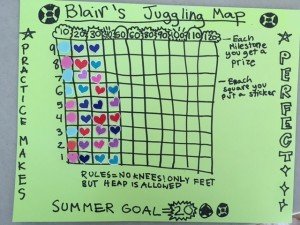
Never discount the power of the chart to motivate kids to reach a goal- especially charts they make themselves (note that goal has yet to be met but working on it!)
At least where I live (Palo Alto, California, U.S.A.), passion is the newest element that kids are supposed to add to their dazzling college resumes. It’s not enough to have great grades and do varsity sports, now teens are supposed to also have a “passion,” whether it’s global warming or raising foster dogs.
That’s why I loved the part of Angela’s book where she explains in detail what it means to have a passion and explores exactly how people stumble upon the “thing” that they end up pursuing with so much grit.
Angela has some experience with trying to find a passion because she spent time as a neurology grad student, management consultant, high school teacher, and tech COO before realizing that her true path lay in the study of psychology (she entered the PhD program at Penn when she was pregnant with her first daughter).
Why it’s hard to find a passion
Some people may realize like a bolt of lightening that they want to study sharks or cure childhood obesity, but most of us won’t have the luxury of this sort of epiphany.
We’re more likely to figure out what we love through multiple exposures and prolonged engagement with something that we might ‘sort of’ like or be ‘kind of’ interested in.
In fact, it may take longer than you’d imagine before you realize what it is that you must pursue.
The reason it takes so long is because of how our brains work.
When people are bored, they know right away. Researchers can ask people if they’re bored when doing a task and they will be very clear if the answer is yes.
It’s much harder to ascertain if a person is truly interested in a task.
When researchers ask people, “Are you interested in what you’re doing?” the answer is often, “Not really.” But these same people will manifest behavior that looks a lot like interest — continuing to do the task, not wanting to break away from it, etc.
It takes lots of exposure to something for kids to develop an interest in it…
For parents, this means that we have to keep exposing our kids — over and over again — to activities, ideas, and pursuits that they may not express a ton of interest in.
Sounds hard, right? Likely it’s a process we’re all familiar with at the dinner table. You’re tempted to never make broccoli again after your kids reject it a few times. But you know their tastes keep changing and experts recommend that you bring back foods that were previously rejected or your kids will eat nothing but white rice for the rest of their lives.
So when it comes to interests and passions, it’s most beneficial to our kids if we give them multiple exposures to a variety of different pursuits … that we not have a fixed mindset about what may interest them as they grow and change.
So if kids try lots of things and quit, what then?

This photo links to Angela’s TED Talk
Angela has a rule in her house — never quit on a rainy day. In other words, never quit because of having to play in bad weather or striking out, or experiencing some other adverse situation.
Instead, encourage your kids to get through the season and to not quit until there’s a natural stopping place (could be the last session you paid for, etc.)
What if kids have a passion for something that you find less than inspiring?
From Minecraft to marijuana legalization, kids can get fixated on pursuing interests that feel less than ideal. So what to do?
That’s a tough one and Angela has not addressed it directly. But she does have another rule in her house I thought was a good: everyone has to do one ‘hard thing.’
On CBS news she said, choosing the ‘hard thing’ is not an open-ended question — it’s multiple choice.
While her teen girls might be passionate about Instagram, Angela is clear that they can’t choose that as their ‘hard thing.’ Instead, it has to be a sport or musical instrument.
Sports or musical instruments may not be right for your family, but the idea is to encourage your kids to pick something they have enough interest in to pursue and get them to stick with it long enough to make progress.
Can grit be taught or is it just a trait you’re born with?
There’s a lot of debate about this question. Angela gives some ideas for how to ‘grow grit’ but they are more anecdotal, perhaps because the research here is a bit less clear.
I have two girls and one is definitely more naturally gritty in the way Angela defines it. She sets goals and tends to stick to them, and loves to practice and get better — she’s inspired to improve (flute and soccer are her main areas of focus).
My other daughter has lots of big ideas, but often abandons her plans before they’re fully realized, and isn’t particularly driven to practice. So my tiny data set would lead me to the conclusion that there is some innate element to grit.
While you can’t teach your kids to have innate drive, by setting clear expectations around commitment and practice, you increase the likelihood that they’ll experience the relationship between effort, time and progress.

My daughter worked for a year to over come her fear of running hurtles.
My less gritty daughter’s found a track program that she loves. She’s kept running for several years. She’s motivated to train with her team; and while she doesn’t do much practice on her own, she’s made noticeable improvement. The findings in Grit support the idea that sustained practice is best done with a coach — and that it’s tough to independently figure out where and how to improve.
I have no idea if my girls will pursue these interests for their whole lives, but I’m trying to encourage them to keep going long enough to feel competent, as I do believe competence builds confidence. And you can’t get to competence without putting in the time.
One big thing that ‘gritty’ people have: purpose
And finally, one of the most compelling parts of Angela’s exploration of grit is the connection she makes to purpose.
From her many conversations with gritty people, she discovered that beyond perseverance, persistence, and prolonged practice, they all shared a belief that what they do is important, valuable or makes a difference in the world in some way.
This was true for musicians, athletes, business people, and even one sanitation worker she interviewed. And she has some great tips for trying to find purpose. (Read the book!)
So now you’re wondering…how gritty are you?
You can take the ‘grit scale’ and find out how you rank on Angela’s assessment.
I’m in the mid range in terms of grit — I bounce around from interest to interest and have never had a laser focus on one thing. It’s a good personality for a writer! But reading Angela’s book gave me new inspiration to look hard at the things I dabble in and try and commit more deeply so I can continue to grow and learn. Even an old dog can get gritty…or so I’d like to believe!
Are you getting gritty with your kids? Or skeptical that grit is yet another parenting fad? Post a comment and let us know!
Victoria is the founder of Palo Alto Pulse, a website that shines a light on the people and ideas that make Palo Alto such a cool place to live. She is also a senior contributing writer for the Doris and Donald Fisher Fund in San Francisco, where she supports the work of KIPP charter schools and other innovative educational organizations. Victoria lives in Palo Alto with her two teenage daughters, her husband and, the grittiest member of her family, her dog Abby.
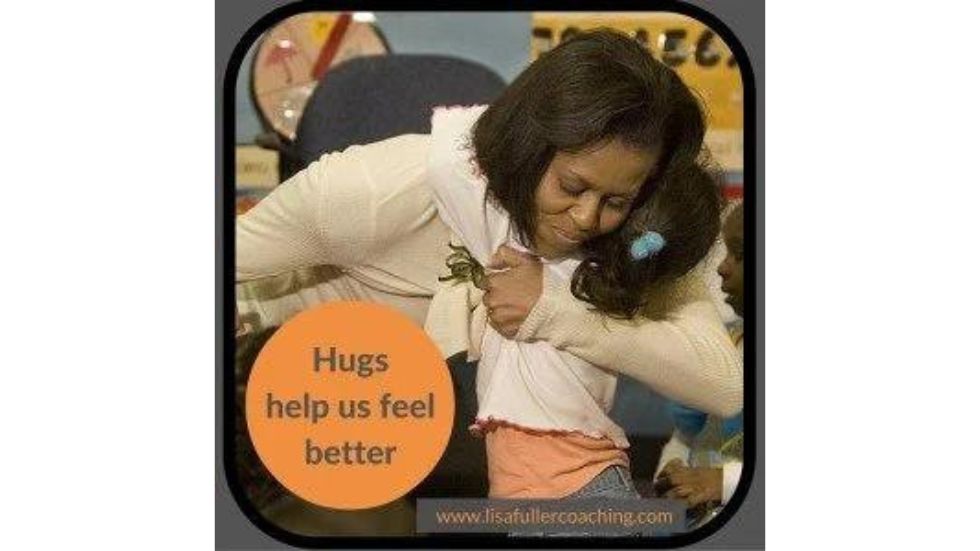
by Lisa Fuller | Mar 26, 2016 | Communication, Connection & Love, Encouragement, General, Parenting, Self-regulation
Shortly after Eric finished up my 7- week parenting series, he sent me this story which beautifully illustrates the power of asking for a hug.
Last week on my way home from work, my wife Stephanie sent me a text that our daughter Grace (5) was being a handful, was in a horrible mood and that she had had it with her.
When I got home, I walked into the house and went straight to Grace and asked her for a hug. At first she turned her back and crossed her arms, and said no.
I then decided to ask her one more time and after a 5-second pause, she turned and gave me a big hug.
Steph said it was like someone flipped a switch on Grace. She went from being in the worst mood to acting as if she was having the best day ever.
It’s amazing to see the kind of impact and dynamics that something as simple as asking for a hug can have on a 5 year old.
Honestly, before taking your class, I probably would have come home and punished Grace for misbehaving and the entire afternoon would have been ruined for the whole family.
Asking for a hug sounds almost too easy, right? Too simple to be true?
However, while it’s simple… there’s a subtle tweak that’s key to the effectiveness of this parenting strategy.
“I could use a hug” vs. “Can I give YOU a hug?”
The first taps into your child’s deep need for significance and belonging. When you ask for a hug from your child, you acknowledge that they make a difference to you and in fact have a positive influence on your life.
In the later, you are reinforcing what your child hears and perhaps feels frequently: That children need help from grownups to feel better.
The parenting tool of asking for a hug (for YOU) is simple, easy, and effective if done from the perspective of genuine connection, genuine desire for your child to assist you! (Plus, who doesn’t love hugs? I love it!)
Try it out.
Ask a friend to be your parent and say these two phrases to you:
Could you give me a hug?
and
You look like you could use a hug.
Do you notice a difference in how you feel after each?
This week look for an opportunity to ask your child for a hug.
I’d love to hear how it goes in the comments below!
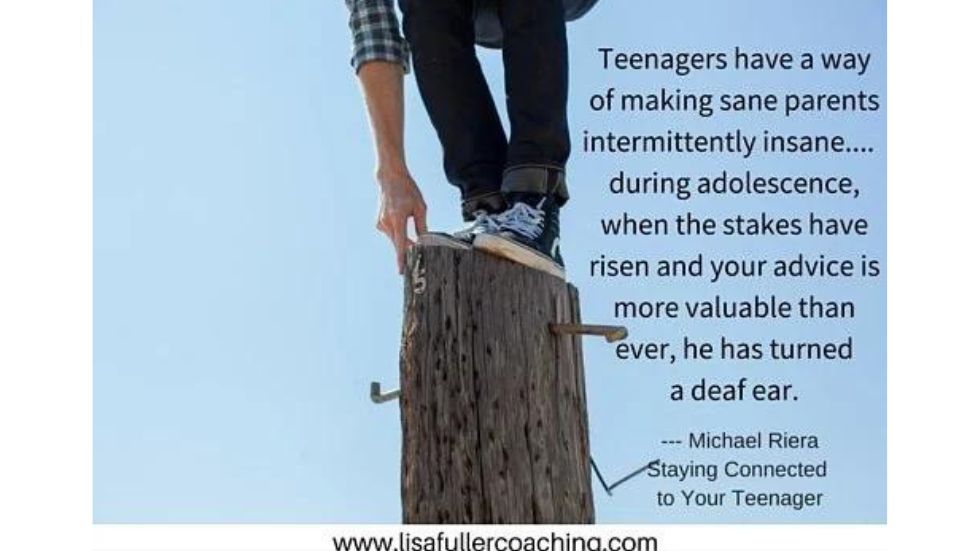
by Lisa Fuller | Mar 6, 2016 | Conflict, General, Parenting, teenager
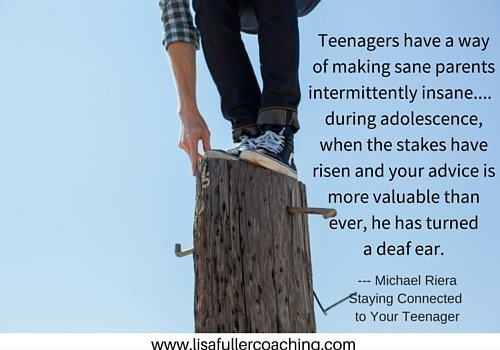 My relationship with my teen has been jaggedy.
My relationship with my teen has been jaggedy.
Over the past several months I’ve felt tested and provoked like never before. It’s not easy. We’re on solid ground right now but I admit to having intermittent moments of insanity.
One thing I’ve learned as a parenting educator and so called expert is that I’m not the only one going through this… that’s a relief. 😌
Are you facing challenges with your teen that leave you doubting yourself?
As my teen has veered into the territory of seriously challenging behavior, I’ve kept one goal in mind, as hard as it is, stay connected.
7 ideas for how to stay connected to your teen – even when they’re REALLY pushing your buttons:
- Exaggerate positivity — A study by Deborah Yurgelun-Todd found that teens use their “gut” as opposed to their frontal lobe to interpret facial expressions. In short an adult’s “fearful facial expression” was misinterpreted as anger, confusion or sadness 50% of the time.

Source:www.pbs.org/wgbh/pages/frontline/shows/teenbrain/interviews/todd.html
Knowing this, I’ve amped up my enthusiasm when I interact with my son and try to greet him with a huge “I love you” smile on my face — one that can’t be misinterpreted — when he comes home.
This strategy has helped me regain some closeness with him, and he frequently asks me to check in on him when he’s waking or retiring for the evening. You still matter to your teen, even though they’re doing their darndest to push you away.
2. Use a quiet tone of voice — Although you may be feeling emotional, when possible use a quieter voice with your teen. Similar to facial expressions, teens can interpret increased volume as anger.
3. Be explicit — When you ARE angry or annoyed about something say it in plain language, using as few words as possible. For example:
I’m angry that you didn’t text me letting me know you’d be late.
I’m angry because I’ve been so worried that something happened to you and I love you.
Try to avoid lecturing or adding editorial comments (e.g., “We have talked about the need to text me back a million times and I’m sick of it!”). You may find that stating your feelings clearly calms you down too.
[tweetthis]Sometimes it takes a moment for us to uncover why we’re angry at our teen… oh yeah, it’s because I would step in front of a bus for this kid if necessary![/tweetthis]
Deborah Yurgelun-Todd’s study supports this strategy, too.
4. Make yourself available to your teen, even when it feels inconvenient. The other night I was snug in my bed when my teen came home and asked me to come watch Survivor with him. I did 🙂
5. Use humor — Teens take themselves seriously. The angst and insecurity they feel is real for them even though you may see it as overly dramatic. I’ve found humor – the cornier the better – can provide a counter weight to all that teen gloom. Ridiculous as it sounds, I use silly voices, faces and poop talk. These tactics lighten ME up and make me laugh.
I’ll spare you the details but one night I was woken by police banging on my door. Apparently I had to retrieve my son from a parking lot not far from my home. When I arrived, he was fine, his “crime” with sitting in a car with a girl (no substances). He got in the car and looked at me, afraid of my reaction. I cracked a smile and started laughing. He said “Mom, I’m glad you’re laughing. I’m sorry you had to to come get me.”
Use your sense of humor to bring levity to what can feel like a heavy relationship with your teen. They’ll be relieved that you’ve got space to breathe and have fun and it just might open the door for them to do the same.
6. Post a visual reminder that clearly shows the essence of your child — Find a photo of your teen as a younger person – a photo that you love – with an expression on their face that captures your heart. Carry this photo with you or put it somewhere easy to see. Use this as a visual reminder of who this kid really is in his heart. Your teen can look and act downright ugly and an image can remind you of the deep love you have for him, even when you’re not feeling it every moment.
of your teen as a younger person – a photo that you love – with an expression on their face that captures your heart. Carry this photo with you or put it somewhere easy to see. Use this as a visual reminder of who this kid really is in his heart. Your teen can look and act downright ugly and an image can remind you of the deep love you have for him, even when you’re not feeling it every moment.
7. Take care of yourself — Make this a priority because in order to be on top of your game, in order to actually do 1 – 5, you need a deep well of strength to draw from. Remember, children do better when they feel better and so will YOU. You can’t expect humor, listening, positivity, etc. from yourself when you’re depleted.
Exercise, rest, see friends, get outside- whatever fills your tank, find time to do it. Your teen will thank you!
Parenting a teen is no joke. Dig deep, breathe deep, and in that quiet space invite faith that they will be okay, that you’re doing the best you can by being present when you can, setting limits as needed and providing unconditional love. They won’t be an adolescent forever.
Lastly, although parenting a teen can lead to a deep desire for control – especially when their behavior seems out of control – the same principle of kindness and firmness applies. Although I’m tempted to ‘lay down the law’ with my teen, I know that if I lose connection with him, I have no chance of helping him make good choices in his life.
Have you found other ways to manage difficult adolescent behaviors? Please share in the comment section below or send me an email. I love to hear from you.
If you’re in the Bay Area, join me for Parenting with Positive Discipline. This series is geared for parents of children of all ages.
Ready for more, watch this in-depth interview where Dan Siegel discusses his book Brainstorm ~ the scientific developmental stage of adolescence.
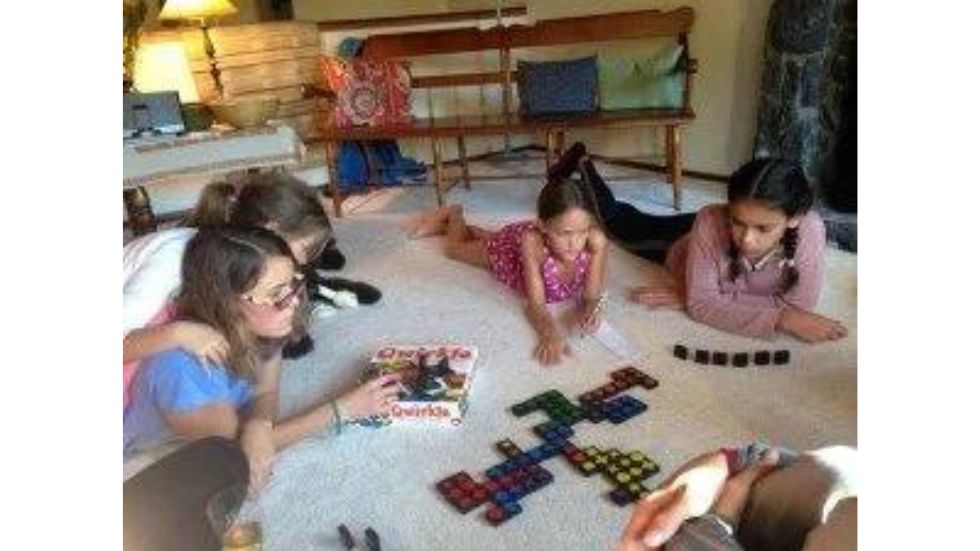
by Lisa Fuller | Dec 10, 2015 | Communication, Connection & Love, Feelings & Emotions, General, Parenting
If you’re like me, you’re struggling right now to wrap your head around all that’s been going on in the world.
I don’t pretend to have the answers, but from my perspective it seems like disconnection is at the root of so much of the insanity and violence.
I believe that deepening and strengthening our connections — to each other, to the planet, to our families — is our path to healing.
It might seem simplistic, but I’m convinced that our collective well being and health begins with the health of our families.
And where better to start than with the holidays?
We all crave warm, loving connections with our family and children, this time of year more than ever. Bring on the dark storm so that we can be snug together, play a game, listen to music, and share a meal.
And while there may be heated moments of competition or disagreement, it’s all good because we’re together, making time for each other.
The following gift ideas may help you with this goal.
The list is organized into four categories:
- Tools
- Practices
- Games
- Books

Tools
- Dinner Bell. This is so simple yet almost daily I’m reminded of the power of our dinner bell. Whether I make breakfast, a snack, lunch on the weekends, or dinner, I often notice a wee bit of tension building when my child isn’t eagerly awaiting my labor of love. Then I see the bell and it dawns on me: “Just ring the bell.” I can feel my expectations melting away with that simple action. Message delivered. I can breath and move on.
- Mobilhome. Our devices get in the way of real connection. The
Mobilhome is a super cool way to — without making a stink — let your friends and family know that when socializing in your home, you encourage a device free zone. By establishing a place for everyone’s phones, you’re acknowledging the value of spending undistracted time together. The Mobilhome is an original artisan project created by Yvonne O’Hare (we met at a writing workshop). When ordering one, use the code “holiday2015” until December 15 for an extra 10% discount with free shipping. If it’s out of your price range simply find a basket for phones to call home.

- Positive Discipline Tool Cards. I gift these to parents who
enroll in my Parenting with Positive Discipline series. They are concise and powerful. Topics include: allowance, letting go, setting limits, kindness and firmness at the same time, silent signal and 47 more! Great for when you need a focused idea on one particular challenge.
Practices
- “Passing the Squeeze,” a ritual shared by my friend Catherine, will help you slow down and mindfully connect before meal time. You begin each family lunch or dinner with “passing the squeeze.” Everyone holds hands (people may choose to close their eyes if they wish). The person who cooked starts a hand squeeze in one direction and it gets passed around. When the squeeze gets back to the person who started it, she squeezes hands in both directions and then everyone squeezes hands. For extra credit meditation kudos, the person who cooked rings a meditation chime. Everyone listens for as long as possible before picking up cutlery and chowing down (I’ll let you know how that goes over at our house:).
- Family Meetings… Why have family meetings? They
- Build closeness by creating a sense of significance and belonging for all.
- Give children and their parents a place and time to practice leadership, responsibility, problem solving, empathy and love.
- Establish a forum for communication that becomes increasingly significant as children mature.

Once you begin to hold family meetings you’ll experience even more tangible and intangible benefits for your family!
Join my list to download: Unlock the Power of Family Meetings: Your Free 7-Step Guide.
Games
- Qwirkle. I love this game! Using six unique colors and shapes your mind is challenged to find configurations that conform to the rules (no repeating) and give you the most points. It takes 30 – 60 minutes to play depending on how much conversation and silliness you enjoy. Recommended for ages 6 and up.

- Sorry. Be sure to get the original version. What can I say? This is simple and fun. My son warned me against recommending Sorry because he said it gets people too riled up 🙂 That said, it’s most fun when everyone gets invested, regardless if you’re 7 or 70! It’s equal parts skill and luck… maybe more luck. Old school fun!
- Hunt the Thimble. My friend Anna loves to play this one on Sunday evenings after their family dinner at her mother in-law’s house. Try it when you’ve got friends over or with the extended family. All ages! Here’re the steps to play:
- Find a thimble
- Choose someone to be “it”
- Tell that person to leave the room
- Choose another person to be the hider
- Call in the seeker to start looking (it should be hidden within eyesight, not under or in anything)
- The whole group can yell out “colder!”…”warmer…” Until the thimble is discovered.
- Let the last hider now become the seeker, and so forth until someone rings the dinner bell 😉
Side note to parents of teens… it’s more important than ever to make the time to play games and simply find ways to be together. Don’t rely on your kids to come to you and ask for this time — if they do, consider yourself lucky! When your teen resists family time, I suggest persistence. Let them know that being with them is important to you. Here are general tips from Aha! Parenting for keeping connected to your teen.
Books
My grandfather used to read stories aloud and even when I was too young to understand the content, I have warm memories of sitting on the floor next to him as he read while the entire family listened. The tone of his voice and response of those listening was enough for me. Here are some of my favorites to read to my children.
- The Tale of Custard the Dragon by Ogden Nash. So
 fun and lyrical! Enjoyable for every age! Here’s a taste:
fun and lyrical! Enjoyable for every age! Here’s a taste:
Belinda lived in a little white house, with a little black kitten and a little gray mouse, and a little yellow dog and a little red wagon, and a realio, trulio little pet dragon…. Custard the dragon had big sharp teeth, and spikes on top of him and scales underneath, mouth like a fireplace, chimney for a nose, and realio, trulio daggers on his toes.
- Sarah’s Unicorn by Bruce Coville. While this is great for early readers, I read it over and over to my children when they were 4 to 8 years old. We’re talking pages falling out. It was the hands down favorite for my son who struggled most with reading and finding interest in books. It’s out of print but you can find it used.
- Charlotte’s Web, Stuart Little, and Trumpet and the Swan by E.B. White. What I love about E.B. White is his spaciousness – these stories are told at a human pace and scale. And what could be better than a mouse and a pig for main characters. The Trumpet and the Swan was harder for my daughter to relate to… maybe because she’d been immersed in the Harry Potter series and the change of pace was too dramatic? For ages 6+.

- The Gifts of Imperfection: Let Go of Who You Think You’re Supposed to Be and Embrace Who You Are by Brené Brown. This one is for YOU to bolster your connection with yourself!! I come back to this book again and again as I find its message
 continually challenging and interesting. There are 10 guideposts for living our most excellent imperfect life. Take this a step further by gathering your most curious friends, and meet monthly to explore each guidepost.
continually challenging and interesting. There are 10 guideposts for living our most excellent imperfect life. Take this a step further by gathering your most curious friends, and meet monthly to explore each guidepost.
Cultivate those activities that feed your connection to self and others.
Relax and be present. That’s what your kids want from you more than anything.
To increase the likelihood that you can relax and slow down, focus on  activities like these:
activities like these:
- Take a bath
- Exercise, take walks
- Cook or take out foods that make you feel good
- Make time to read a good book
- Go to bed early
- Do something creative
In general, try to keep it simple, focus on the inside, notice the hilarity
and joy of spending time with kids… generally BE KIND TO YOURSELF. That’s it.






















 continually challenging and interesting. There are 10 guideposts for living our most excellent imperfect life. Take this a step further by gathering your most curious friends, and meet monthly to explore each guidepost.
continually challenging and interesting. There are 10 guideposts for living our most excellent imperfect life. Take this a step further by gathering your most curious friends, and meet monthly to explore each guidepost.

